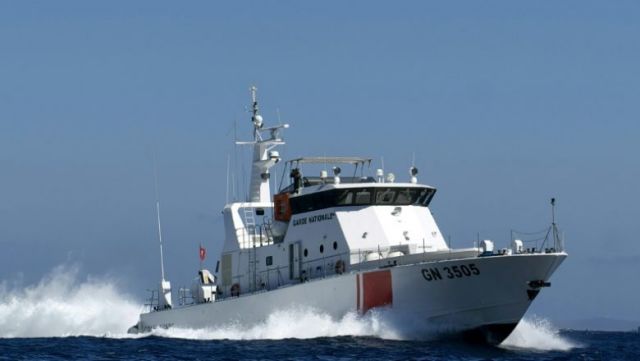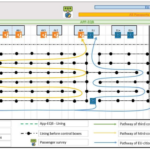Despite an alleged repayment of funds for migration defence, Tunisia is cooperating with the EU. Fewer refugees are also arriving across the Mediterranean – a decrease by a factor of seven.
In June, the EU Commission signed an agreement on joint migration control with Tunisia. According to the agreement, the government in Tunis will receive €105 million to monitor its borders and “combat people smuggling”. Another €150 million should flow from the Neighbourhood, Development and International Cooperation Instrument (NDICI) in the coming years for the purposes of border management and countering the “smuggling” of migrants.
Tunisia received a first transfer under the agreement of €67 million in September. The money was to finance a coast guard vessel, spare parts and marine fuel for other vessels as well as vehicles for the Tunisian coast guard and navy, and training to operate the equipment. Around €25 million of this tranche was earmarked for “voluntary return” programmes, which are implemented by the United Nations Refugee Agency and the International Organisation for Migration.
However, a few weeks after the transfer from Brussels, the government in Tunis allegedly repaid almost the entire sum. Tunisia “does not accept anything resembling favours or alms”, President Kais Saied is quoted as saying. Earlier, the government had also cancelled a working visit by the Commission to implement the agreement.
Successes at the working level
Despite the supposed U-turn, cooperation on migration prevention between the EU and Tunisia has got off the ground and is even showing initial successes at the working level. Under the agreement, the EU has supplied spare parts for the Tunisian coast guard, for example, which will keep “six ships operational”. This is what Commission President Ursula von der Leyen wrote last week to MEPs who had asked about the implementation of the deal. Another six coast guard vessels are to be repaired by the end of the year.
In an undated letter to the EU member states, von der Leyen specifies the equipment aid. According to the letter, IT equipment for operations rooms, mobile radar systems and thermal imaging cameras, navigation radars and sonars have been given to Tunisia so far. An “additional capacity building” is to take place within the framework of existing “border management programmes” implemented by Italy and the Netherlands, among others. One of these is the EU4BorderSecurity programme, which among other things provides skills in sea rescue and has been extended for Tunisia until April 2025.
The Tunisian Garde Nationale Maritime, which is part of the Ministry of the Interior, and the Maritime Rescue Coordination Centre benefit from these measures. This MRCC has already received an EU-funded vessel tracking system and is to be connected to the “Seahorse Mediterranean” network. Through this, the EU states exchange information about incidents off their coasts. This year Tunisia has also sent members of its coast guards to Italy as liaison officers – apparently a first step towards the EU’s goal of “linking” MRCC’s in Libya and Tunisia with their “counterparts” in Italy and Malta.
Departures from Tunisia decrease by a factor of seven
Since the signing of the migration agreement, the departures of boats with refugees from Tunisia have decreased by a factor of 7, according to information from Migazin in October. The reason for this is probably the increased frequency of patrols by the Tunisian coast guard. In August, 1,351 people were reportedly apprehended at sea. More and more often, the boats are also destroyed after being intercepted by Tunisian officials. The prices that refugees have to pay to smugglers are presumably also responsible for fewer crossings; these are said to have risen significantly in Tunisia.
State repression, especially in the port city of Sfax, has also contributed to the decline in numbers, where the authorities have expelled thousands of people from sub-Saharan countries from the centre and driven them by bus to the Libyan and Algerian borders. There, officials force them to cross the border. These measures have also led to more refugees in Tunisia seeking EU-funded IOM programmes for “voluntary return” to their countries of origin.
Now the EU wants to put pressure on Tunisia to introduce visa requirements for individual West African states. This is to affect, among others, Côte d’Ivoire, where most of the people arriving in the EU via Tunisia come from and almost all of whom arrive in Italy. Guinea and Tunisia come second and third among these nationalities.
Reception from the Frontex Director
In September, three months after the signing of the migration agreement, a delegation from Tunisia visited Frontex headquarters in Warsaw, with the participation of the Ministries of Interior, Foreign Affairs and Defence. The visit from Tunis was personally received by Frontex Director Hans Leijtens. EU officials then gave presentations on the capabilities and capacities of the border agency, including the training department or the deportation centre set up in 2021, which relies on good cooperation with destination states of deportation flights.
Briefings were also held on the cross-border surveillance system EUROSUR and the “Situation Centre”, where all threads from surveillance with ships, aircraft, drones and satellites come together. The armed “permanent reserve” that Frontex has been building up since 2021 was also presented to the Tunisian ministries. These will also be deployed in third countries, but so far only in Europe in the Western Balkans.
However, Tunisia still does not want to negotiate such a deployment of Frontex personnel to its territory, so a status agreement necessary for this is a long way off. The government in Tunis is also not currently seeking a working agreement to facilitate the exchange of information with Frontex. Finally, the Tunisian coast guard also turned down an offer to participate in an exercise of European coast guards in Greece.
Model for migration defence with Egypt
Aiding and abetting “smuggling” is an offence that the police are responsible for prosecuting in EU states. If these offences affect two or more EU states, Europol can coordinate the investigations. This, too, is now to get underway with Tunisia: In April, EU Commissioner Ylva Johansson had already visited Tunis and agreed on an “operational partnership to combat people smuggling” (ASOP), for which additional funds will be made available. Italy, Spain and Austria are responsible for implementing this police cooperation.
Finally, Tunisia is also one of the countries being discussed in Brussels in the “Mechanism of Operational Coordination for the External Dimension of Migration” (MOCADEM). This working group was newly created by the EU states last year and serves to politically bundle measures towards third countries of particular interest. In one of the most recent meetings, the migration agreement was also a topic. Following Tunisia’s example, the EU could also conclude such a deal with Egypt. The EU heads of government are now to take a decision on this.
Published in German in „Migazin“.
Image: Bateau de la Garde Nationale (MoI Tunisia, CC BY 4.0).





Leave a Reply